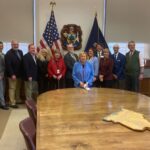Senate enacts Vitelli bill to make it easier for municipalities to expand high-speed internet
On Wednesday, the Maine Senate unanimously enacted a bill from Sen. Eloise Vitelli, D-Arrowsic, to re-establish the ability of municipalities to attach their equipment to utility poles without paying “make-ready” fees.
“Access to reliable, high-speed internet is an issue across the state, but today’s vote puts us one step closer to making real progress,” said Sen. Vitelli. “Towns and cities taking the proactive step to set up municipal broadband offerings for their residents shouldn’t be roadblocked by utility companies and exorbitant cost estimates.”
As amended, LD 1192, “An Act To Establish Municipal Access to Utility Poles Located in Municipal Rights-of-way,” exempts municipalities from “make-ready” fees when they’re attaching equipment related to community safety or providing broadband services to unserved or underserved areas.
Currently, due to recent rule changes from the Maine Public Utilities Commission, entities attaching equipment to utility poles must pay what are called “make-ready” fees to utilities to compensate them for the labor related to getting the poles ready for the new attachments.
The Maine Municipal Association, city of Lewiston, city of Sanford and town of Islesboro all spoke in favor of LD 1192 at a recent public hearing, as well as a representative of the 3 Bridged Island Broadband project, which would bring broadband to Arrowsic, Georgetown and Southport.
“The ability of utilities to locate within the rights-of-way, owned and maintained by municipalities, is to provide for the infrastructure (space) essential to public health, safety and welfare. A municipality plans for, provides access to, and preserves space within its rights-of-ways for these essential utilities,” said Stephen Buck, the city manager of Sanford. “Broadband, via fiber optics, is now being defined as a necessary public infrastructure. The future calls for the need for this space on the poles.”
Buck explained that Sanford will pay more than half a million dollars in “make-ready” fees to construct a municipally owned dark fiber network, significantly increasing the cost of the project.
LD 1192 now goes to Gov. Janet Mills’ desk. She has 10 days to either sign the bill into law, veto it, or allow it to become law without her signature.

